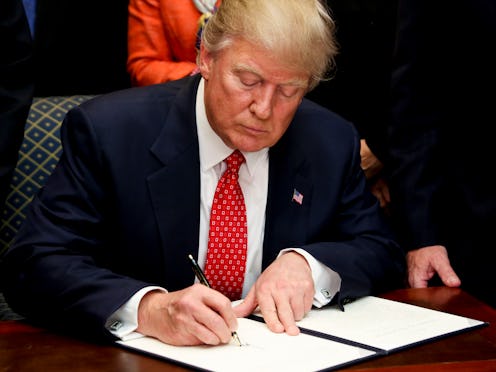News
Trump Signs New Executive Order On Immigration

President Donald Trump has signed his new executive order on immigration, and it bears many similarities to the original whose enforcement was blocked by U.S. courts. However, unlike the original order, this new executive order temporarily restricts travel to the U.S. for people from six majority Muslim nations. That number is down from the original seven, with Iraq having been removed from the list of restricted countries. The new order still includes a temporary ban on refugees entering the U.S., but removes the earlier order's extra restrictions on Syrian refugees. Despite the changes, this Trump's new executive order on immigration is still expected to be widely challenged in courts.
Trump's previous executive order led to widespread confusion at airports both within and outside of the U.S., the detention of several green card holders, and airport protests that even drew appearances by members of Congress. The original list of restricted countries — Iran, Iraq, Libya, Somalia, Sudan, Syria, and Yemen — also raised concerns of government sanctioned Islamophobia and xenophobia. This is due to the fact that all the countries are majority-Muslim, though many countries that have terrorism concerns, like Saudi Arabia, where the terrorists of 9/11 were from, are not included on the ban. Trump's revised executive order comes with similar concerns.
Iraq's removal from the list of restricted countries marks one of the bigger changes from the previous executive order. The New York Times reports that the change came via Iraqi officials' assuring Secretary of State Rex Tillerson that their nation's vetting processes were sufficient. The new order also clarifies that legal permanent residents valid visa holders are exempt from the new restrictions. Under the old order, green card and visa holders were being detained and barred entry to the U.S. despite having previously gone through all the necessary vetting and application procedures. Still, people from Iran, Libya, Somalia, Sudan, Syria, and Yemen seeking to get visas will be unable to apply during a three-month ban.
Under this new order, there will also still be restrictions on refugees. Refugees will be banned from entering the country for 120 days. Afterward, the number of refugees accepted into the country will be limited to 50,000 people a year. This number is down significantly from the goal of 110,000 in 2017 that the Obama administration set last year.
The new executive order is set to go into effect on March 16, but the fight to halt its enforcement may begin sooner as immigration activists and advocates fear a "roundup" of people living in the country illegally may be next.